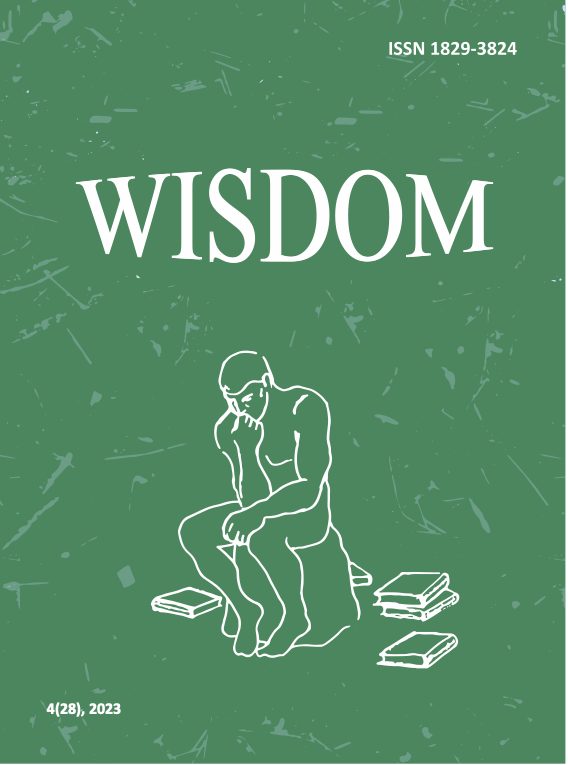Irony As “Ferment Of Philosophical And Aesthetic Speculation” (By Friedrich Schlegel And Thomas Mann)
DOI:
https://doi.org/10.24234/wisdom.v14i1.309Keywords:
romantic irony, progressive universal poetry, negative-progressive meta-reflection, literary self-referentialityAbstract
The focus of our scientific contribution is German Romanticism with its early romantic concept of self-referentiality or romantic irony. In the article, according to Safransky (Safranski, 2007, p. 12), romanticism is considered not only as a literary era, but also as a ”mental attitude“ that can be imprinted in any era. Using the work of Thomas Mann as an example, we illustrate it by looking at the epoch of modernity. In the Romantic period irony became a philosophy of life and art. It is also a central concept for Thomas Mann. The goal of this scientific article is to demonstrate the consequent realization of the concept of (early) romantic irony of a self-reflective narrative in the work by Thomas Mann. In the article, as a conclusion, the thesis is put forward that Thomas Mann seeks to synthesize the spheres of knowledge and aesthetics, but this “synthesis” has a slightly different meaning than that of the early romantics. . The common ground of their concept of irony is mediating between opposites, but at the same time, these opposite sides are to be preserved in their specificity and can only be unified selectively. Another similarity that needs to be identified is the functionalization of art as criticism, in other words, of “literary criticism”.
Downloads
References
Detering, H. (2012). Thomas Manns amerikanische Religion. Theologie, Politik und Literatur im kalifornischen Exil. Frankfurt a.M.: Fischer.
Ewen, J. (2017). Erzählter Pluralismus. Thomas Manns Ironie als Sprache der Moderne. Frankfurt a. M.: Vittorio Klostermann.
Ricarda Huch: Die Romantik. I: Ausbreitung, Blütezeit und Verfall Blütezeit der Romantik. Leipzig 1899; II: Ausbreitung und Verfall der Romantik. Leipzig 1902.
Kerschbaumer, S. (2018). Immer wieder Romantik. Modelltheoretische Beschreibungen ihrer Wirkungsgeschichte. Heidelberg: Winter.
Kohns, O. (2007). Romantische Ironie und die Möglichkeit von Metaliteratur. Metaisierung in Literatur und anderen Medien: Theoretische Grundlagen – Historische Perspektiven – Metagattungen – Funktionen. Hg. v. Janine Hauthal. Berlin u.a.: De Gruyter, 194-205. DOI: https://doi.org/10.1515/9783110897784.194
Koopmann, H. (1975). Thomas Mann. Theorie und Praxis der epischen Ironie. (Hg. v. dems.). Darmstadt: Wissenschaftliche Buchgesellschaft, 351-423.
Kurzke, H. (1999). Thomas Mann. München: Beck.
Mann, Th. (2001 ff.). Große kommentierte Frankfurter Ausgabe (GKFA). Werke – Briefe – Tagebücher. Hg. v. Heinrich Detering u.a. Frankfurt a.M.: Fischer.
Muecke, D. C. (1982). Irony and the Ironic. London: Methuen.
Nündel, E. (1972). Die Kunsttheorie Thomas Manns. Bonn: Bouvier.
Oesterreich, P. L. (1994). Ironie. Romantik-Handbuch. Hg. v. Helmut Schanze. Stuttgart: Kröner, 351-365.
Pikulik, L. (2000). Frühromantik: Epoche-Werk-Wirkung. München: Beck.
Quendler, Ch. (2002). From Romantic Irony to Postmodernist Metafiction. Frankfurt a. M.: Lang.
Safranski, R. (2007). Romantik: Eine deutsche Affäre. München: Hanser.
Schlegel, F. (1967). Kritische Ausgabe seiner Werke. Bd. 2. Hg. v. Ernst Behler. München: Schöningh.
Downloads
Published
How to Cite
Issue
Section
License
Creative Commons Attribution-Non-Commercial (CC BY-NC). CC BY-NC allows users to copy and distribute the article, provided this is not done for commercial purposes. The users may adapt – remix, transform, and build upon the material giving appropriate credit, and providing a link to the license. The full details of the license are available at https://creativecommons.org/licenses/by-nc/4.0/.















